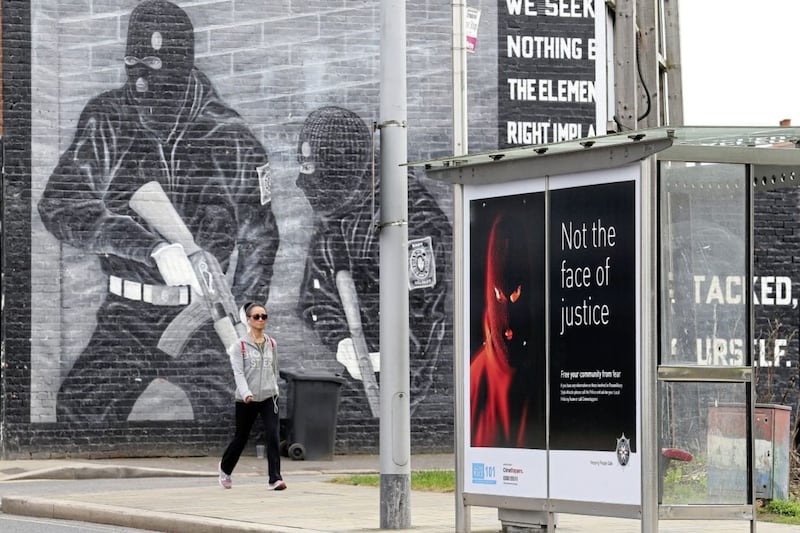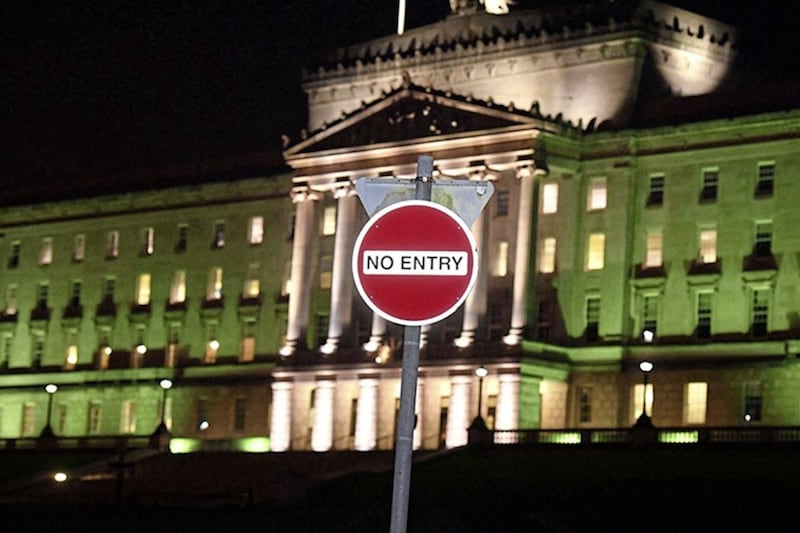POLICE should no longer liaise with paramilitary figures during contentious situations as it only serves to strengthen the structures of illegal organisations, a report into paramilitary groups has recommended.
The Fresh Start Panel Report on the Disbandment of Paramilitary Groups was launched on Tuesday with the press given just 15 minutes notice amid fears it had been leaked.
The report was launched by First and Deputy First Ministers Arlene Foster and Martin McGuinness, and justice minister Claire Sugden.
The DUP leader said when implemented there would be "no hiding place" for those still involved in paramilitary activity.
The report was carried out by a three person panel made up of former politicians Lord Alderdice and Monica McWilliams and solicitor John McBurney.
It makes a number of key recommendations as to how to bring an end to paramilitary activity, and do away with remaining paramilitary structures.
The panel was commissioned by secretary of state Theresa Villiers following the murders of Gerard 'Jock' Davison and that of Kevin McGuigan in Belfast last year.
The PSNI said Provisional IRA members had been involved in the McGuigan murder.
Despite this the report makes only one direct reference to the Provisional IRA with many of the recommendations seemingly aimed towards loyalist paramilitary groups.
The main dissident republican groups did not engage directly with the panel.
Recommendations include the phasing out of the separated regime for paramilitary prisoners in Maghaberry, with the panel saying it encourages continuing paramilitary structures.
"Although the time is not yet right for an end to separation, as we move to a more normal and peaceful society the ultimate aim must be to secure the end of a separated regime for paramilitary prisoners, acknowledging that this may be a longer term goal".
They suggest that this should be done alongside an increased education and training program to help prisoners reintegrate into society following their release.
Controversially they also recommend that the two governments should consider a further period of decommissioning to allow weapons retained or acquired since decommissioning to be disposed of.
"It is our view that the UK and Irish Governments should consider a mechanism being put in place for a limited time to deal with any requests for future decommissioning of residual weapons or materiel", the report states.
However, the most significant recommendation is the liaising at community level between paramilitary figures, both loyalist and republican, and police during marches or periods of public disorder.
Police at community level often negotiate with people believed to have influence during contentious situations, nominated negotiators are often those who hold 'rank' within paramilitary groups.
While the panel noted there may be some 'tactical' reasons for this type of dialogue "in a lawful democratic society this engagement by the state with members of illegal organisations cannot become a permanent norm".
"We believe that Government departments and the PSNI should plan for how their strategic approach to managing contentious issues in communities will evolve.
"We recognise that limited tactical dialogue with representatives of paramilitary groups has been an important and effective means of keeping the peace in some communities.
"We also recognise that this cannot change at once. However, in a lawful democratic society this engagement by the state with members of illegal organisations cannot become a permanent norm as, ultimately, it undermines the development of a culture of lawfulness.
"It is important that those who do business with Government and the PSNI should be consistent positive examples to their communities.
"We recommend that the Executive and the PSNI, in conjunction with the Policing Board, should review their protocols for engaging with representatives of paramilitary groups.
"This change in approach should also apply to other public and community bodies and public representatives."
A police clampdown on ongoing paramilitary activity, including a change in the language used to describe organisations has also been recommended in the report.
"Referring to ‘paramilitary activity’ gives the misleading impression that the criminal activity referred to is in some way part of a concerted militaristic campaign or in pursuit of political objectives.
"We believe, with the exception of any ongoing terrorist activity, the focus should now be on criminality," the report stated.
Alliance Leader David Ford has said the report builds "on work Alliance led in the Department of Justice".
"There is now a huge challenge on the Executive to prepare an action plan which will deliver real change for the benefit of everyone in society", he said.








